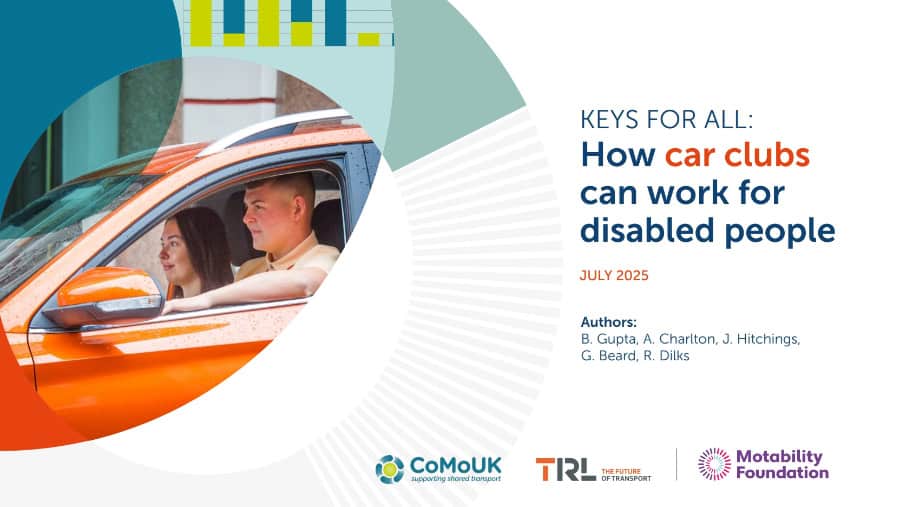Tech & services news for healthcare professionals
In its latest report, national shared transport charity Collaborative Mobility UK (CoMoUK) has outlined a series of actions designed to make car clubs across the UK significantly more accessible for disabled people.
It calls for better support for car clubs from UK Government through the introduction of new policy and funding streams which would help widen access. Among its recommendations are discounted rates and flexible cancellation policies to encourage take-up, as well as a trial of a range of adaptations to car club vehicles.
The report, entitled ‘Keys for All’, also proposes a major awareness-raising campaign and improvements to car club websites and apps so they are easier to use.
Its findings follow the first ever in-depth investigation into the barriers facing disabled people in accessing car clubs, with the aim of making them more inclusive.
The project was carried out by CoMoUK in partnership with transport research consultancy TRL.
It was grant-funded by the Motability Foundation, whose research has shown that disabled people make 25 percent fewer journeys than non-disabled people, with almost no improvement in the past decade.
The report sets out a vision for inclusive car clubs, where staff would be equipped with the knowledge and skills to provide high-quality support for disabled people.
It proposes a pilot which would test out ways of making car clubs more attractive for disabled consumers, such as more flexible cancellation policies.
This could include access to a shorter cancellation window of up to two or three hours before a booking, recognising the unpredictable nature of certain impairments.
The pilot would also trial a discount system for disabled users, ideally linked to existing disability passes, as well as simpler and more accessible pricing.
Richard Dilks, the chief executive of CoMoUK, said: “We are pleased to have delivered the first ever in-depth investigation into car club accessibility, bringing together the needs of disabled people with the views of operators.
“This groundbreaking report shows that while the barriers facing disabled people in accessing the schemes are significant and challenging, they are not insurmountable. We knew from the outset there would not be a ‘one size fits all’ solution, but we have set out a range of clear actions that are needed to make car clubs more inclusive.
“While operators clearly have a big role to play, the onus is also on government to create new policy and funding streams, which are needed to deliver the proposed pilot projects. We would like to see an annual summit bringing together car club operators, local and central government and disability organisations, helping to turn this research into action.”
The report also highlights the need to increase awareness of car clubs among disabled people, explaining how they work and pointing out their benefits. It proposes a “full audit” of the accessibility of car club websites, apps, and communications so they are optimised for disabled people, and specialist training for car club staff.
Dr George Beard, the head of new mobility at TRL, commented: “This report lays the foundations for making car clubs more accessible for disabled people, but we are keen to ensure that the work doesn’t stop here.
“We have set out a number of recommendations for how to turn this in-depth research into real-world action.
“Among key next steps are implementing pilots of inclusive car clubs, which will provide an opportunity to fully test the various solutions we have set out in this report for addressing the barriers faced by disabled people.”
It also calls for better information about the accessibility of car club vehicles to be made available by operators, as well as backing the rollout of a wider range of adapted vehicles over the longer term.
Other potential improvements include a service allowing car club vehicles to be delivered to users’ homes and collected at the end of their booking, as well as an option for the use of alternative drivers such as a carer, friend, or family member.
The findings come after CoMoUK and TRL carried out a comprehensive evidence review of the barriers facing disabled people in accessing car clubs. They engaged with operators, local authorities, disability charities, and disabled people’s organisations, as well as surveying disabled users.
It is hoped that the recommendations will widen access to car clubs, which have more than 870,000 members across the UK and carry a wide range of benefits.
Previous research by CoMoUK has highlighted how the schemes help people save money at the same time as cutting road congestion and improving air quality.
However, the market share of car clubs remains limited and disabled users remain in the minority, with little research done into the barriers that they face until now.
Chelsea Fleming, Programme Director at the Motability Foundation, said: “We are proud to have funded the Keys for All report, which shows the potential for car clubs to support accessible journeys for disabled people.
“At the Motability Foundation we believe that disabled people should not be held back from participating in society because they are unable to make a journey, so research like this is crucial in highlighting how we can build transport equity.”
A provider of accessible car adaptations for disabled drivers and passengers launched a partnership with a charity dedicated to supporting amputees in a commitment to improve the lives of amputees.












